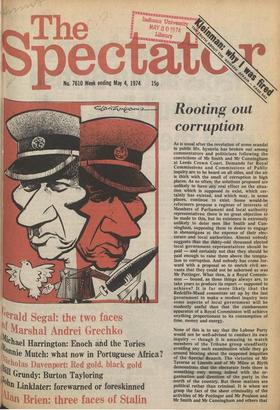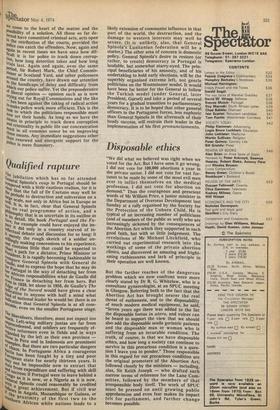Rooting out corruption
As is usual after the revelation of some scandal in public life, hysteria has broken out among commentators and politicians following the convictions of Mr Smith and Mr Cunningham at Leeds Crown Court. Demands for Royal Commissions and Commissions of Public inquiry are to be heard on all sides, and the air is thick with the smell of corruption in high places. As so often, the solutions proposed are unlikely to have any real effect on the situation which is supposed to exist, which certainly has existed, and which may, in some places, continue to exist. Some would-be reformers propose a register of interests of Members of Parliament and local authority representatives: there is no great objection to be made to this, but its existence is extremely unlikely to deter men like Smith and Cunningham, supposing them to desire to engage in shenanigans at the expense of their electorate and local authorities. Almost nobody suggests that the thirty-odd thousand elected local government representatives should be paid — and certainly not that they should be paid enough to raise them above the temptation to corruption. And nobody has come forward with a proposal so to enrich civil servants that they could not be suborned as was Mr Pottinger. What then, is a Royal Commission — bound, as these things always are, to take years to produce its report — supposed to achieve? It is far more likely that the Redcliffe-Maud committee set up by the last government to make a modest inquiry into some aspects of local government will be modestly useful than that the cumbersome apparatus of a Royal Commission will achieve anything proportionate to its consumption of time, money and energy.
None of this is to say that the Labour Party would not be well-advised to conduct its own inquiry — though it is amusing to watch members of the Tribune group steadfastly avoiding any such examination while they go around bleating about the supposed iniquities of the Special Branch. The victories of Mr Taverne at Lincoln and of Mr Milne at Blyth demonstrate that the electorate feels there is something very wrong indeed with the organisation and direction of the party in the north of the country. But these matters are political rather than criminal. It is when we grasp the fact of the sheer criminality of the activities of Mr Pottinger and Mr Poulson and Mr Smith and Mr Cunningham and others that We come to the heart of the matter and the Possibility of a solution. All those so far detected have committed criminal acts, acts open tcl the retribution of the courts, provided the Police can catch the offenders. Now again and pa.galn in recent times we have seen how dif:!eult it is for police to track down corrup how long detection takes and how long irla.is last. Again and again, over the same P.etiod, Sir Robert Mark, the Chief Commissioner at Scotland Yard, and other policemen 4,tound the country, have drawn our attention to the handicaps of delay and difficulty from which our police suffer. Yet the preponderance liberal opinion — opinion such as is now crYing out for Royal Commissions and the like has been against the taking of radical action ,?toake police work more efficient. This is the Lask to which the politicians responsible must "w set their hands. As long as we have the 12teans in principle to track down corruption "nci criminality in public life our concentration nttirost in all common sense be on improving tse means. Any immediate suggestions other renewed and energetic support for the Police is mere flummery.



































